Copyright 2022 by The University of Arkansas Press. All rights reserved. No part of this book should be used or reproduced in any manner without prior permission in writing from the University of Arkansas Press or as expressly permitted by law.
Names: Kirk, John A., 1970 author.
Title: Winthrop Rockefeller: from New Yorker to Arkansawyer, 19121956 / John A. Kirk.
Description: Fayetteville: The University of Arkansas Press, 2022. | Includes bibliographical references and index. | Summary: Why did Winthrop Rockefeller, the scion of one of the most powerful families in American history, move to a mountaintop in Arkansas from New York in the 1950s? In this richly researched biography of the former Arkansas governor, John A. Kirk delves into the historical record to fully unravel that mystery. Provided by publisher.
Identifiers: LCCN 2021029489 (print) | LCCN 2021029490 (ebook) | ISBN 9781682261958 (cloth) | ISBN 9781610757638 (ebook)
Subjects: LCSH: Rockefeller, Winthrop, 19121973. | Rockefeller family. | IndustrialistsNew York (State)New YorkBiography. | PhilanthropistsArkansasBiography. | ArkansasPolitics and government1951 | New York (N.Y.)Biography.
Classification: LCC F415.3.R62 K57 2022 (print) | LCC F415.3.R62 (ebook) | DDC 976.7/053092 [B]dc23
ACKNOWLEDGMENTS
I am grateful to a number of people for their help, support, advice, and encouragement in writing this book.
The books origins lie in my time spent as a scholar-in-residence at the Rockefeller Archive Center (RAC) in Sleepy Hollow, New York, in 2009. I began with the modest goal of examining the relationship between Winthrop Rockefeller and the civil rights movement in Arkansas. What I discovered convinced me to undertake a much larger study. Further grants-in-aid in 2009 and 2016 assisted with follow-up visits.
The RAC is a wonderful place to work for so many reasons, chief among them its beautiful setting, the always professional, knowledgeable, and friendly staff, and a large and ever-rotating number of impressive researchers. This made the RAC not just an archival repository, but also a valuable place to share thoughts and ideas. Thank you to RAC president Jack Meyers; vice president James Allen Smith; executive assistant Norine Hochman; assistant director and head of reference Michele Hiltzik Beckerman; director of research and education Barbara Shubinski; former assistant director, the late Kenneth W. Rose; former senior research archivist Erwin Levold; former grants administrator Camilla Harris; and archivists Bethany J. Antos, Brent Phillips, and Tom Rosenbaum.
The year after the scholar-in-residence award at the RAC, I moved from Royal Holloway, University of London, to accept a new position at the University of Arkansas at Little Rock as the George W. Donaghey Distinguished Professor of History and chair of the History Department. The endowed Donaghey professorship provided funding that aided my research.
The move also placed me in the same city as UA Little Rocks Center for Arkansas History and Culture (CAHC), home to the extensive Winthrop Rockefeller Collection. For over a decade, I kept a number of archivists busy with requests for materials. The same is true for Central Arkansas Library System (CALS) staff who work at the Butler Center for Arkansas Studies, which shares the reading room space. My thanks and appreciation go to SarahBost, Adrienne Jones, Anna Lancaster, Shannon Lausch, Kaye Lundgren, Brian Robertson, Nathania Sawyer, Shirley Schutte, Rhonda Stewart, Colin Woodward, and a host of graduate assistants from the History Departments Public History MA program. Guy Lancaster, editor of CALSs excellent online resource the Encyclopedia of Arkansas, is a font of information on state history. We have held a number of discussions on a number of topics over a number of drinks throughout the years. Guy put me in touch with local historian Don Higgins, who kindly shared his research on Petit Jean Mountain and its environs with me. Deborah Baldwin is associate provost and director of CAHC, and David Stricklin was director of the Butler Center for most of the time I spent doing research there.
Winthrop Rockefellers legacy lives on today in Arkansas in a number of ways, but most visibly through the various organizations that bear his name. The Winthrop Rockefeller Institute, part of the University of Arkansas system, is based on Petit Jean Mountain in buildings that used to belong to Winrock Farms. The Institute is a conference venue and facilitates collaboration... in the free exchange of ideas as an effective way to solve problems. Executive director and CEO Marta M. Loyd has been particularly engaged with my research as someone who strongly believes that Winthrop Rockefellers life experiences should centrally inform the Institutes mission. I always enjoy my visits up to the mountain, not least because there are so many other Rockefeller aficionados there. Among them are Joyvin Benton, Payton Christenberry, LaDonna Cole, Janet Harris, Chris OCain, Paulette Smith, and Cary Tyson.
I have also had the opportunity to work with the Winthrop Rockefeller Foundation, which seeks to relentlessly pursue economic, educational, social, ethnic, and racial equity for all Arkansans. On a number of occasions, I have met with the Foundations CEO Sherece Y. West-Scantlebury and her team members Corey Anderson, Brad Cameron, Lisa Dixon, Regan Gruber Moffitt, and Sarah McBroom. At Winrock International, where the focus is on international development programs, my main point of contact was Dave Anderson.
Lisenne Rockefeller, Winthrop Rockefellers daughter-in-law, was encouraging throughout the research and writing of this book, and she was instrumental in helping to set up my interview with David Rockefeller. I certainly appreciated David taking the time out of his busy schedule to share his thoughts on his brother with me. I was also delighted at various points to discuss my research with two of Winthrop Rockefellers grandsons, Winthrop Paul Rockefeller Jr. and Will Rockefeller, both of whom were born after their grandfathers death.
Peter J. Johnson facilitated arrangements for the interview with DavidRockefeller in New York. Peters two volumes, cowritten with John Ensor Harr, The Rockefeller Century (1988) and The Rockefeller Conscience (1991), are benchmark works on the Rockefeller family that I returned to time and again. I am grateful for their exhaustive research, and for that of many other authors who have written on the topic and whose work is cited here. They have all made my job much easier.
Two anonymous reviewers for the University of Arkansas Press did a thorough and skillful job in assessing the manuscripts strengths and weaknesses. I am thankful to them for their guidance in making this a better book. Copyeditor Matthew Somoroff helped me to hone my prose and attend to the finer details. Appropriately enough, I completed the finishing touches on the manuscript while teaching at Arkansas Governors School (AGS) in summer 2021. AGS is an extraordinary resource for students in the state, and Robin Lasey and Jeff Woods at Arkansas Tech University do an incredible job running it.

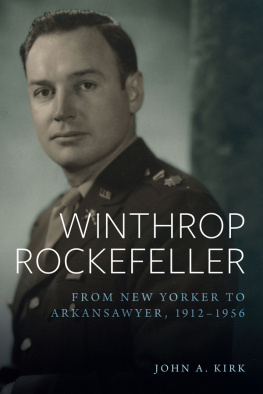
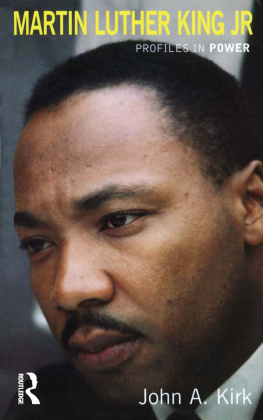
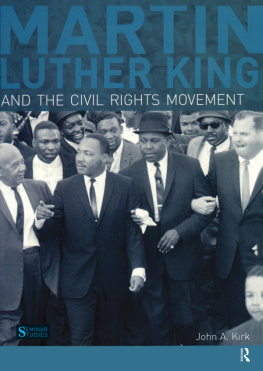
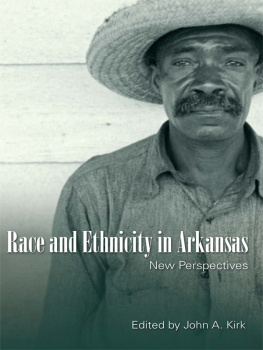





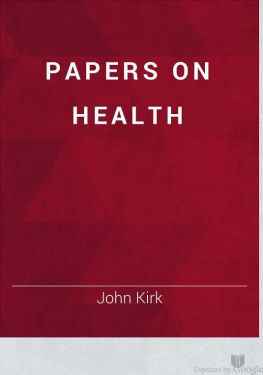

 The paper used in this publication meets the minimum requirements of the American National Standard for Permanence of Paper for Printed Library Materials Z39.48-1984.
The paper used in this publication meets the minimum requirements of the American National Standard for Permanence of Paper for Printed Library Materials Z39.48-1984.